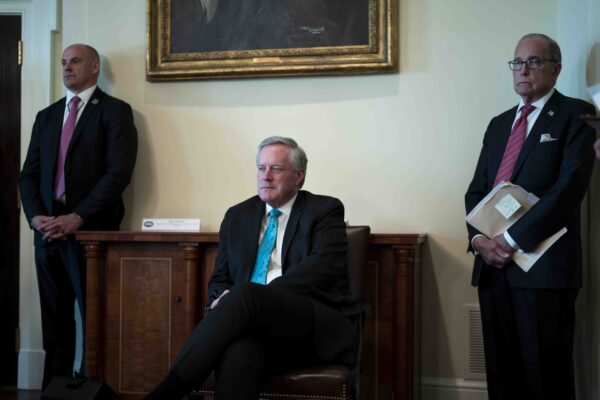President
Donald Trump and his daughter Ivanka listen as Treasury Secretary
Steven Mnuchin speaks during an event on supporting small businesses
through the Paycheck Protection Program in the East Room of the White
House on April 28, 2020. (Win McNamee/Getty Images)
President Donald Trump and Treasury Secretary Steven Mnuchin
suggested a short-term extension to the expanded $600-per-week
unemployment benefits and a moratorium on evictions, which were not
provisions in the Senate GOP relief bill.
The two White House officials acknowledged that the Republicans and Democrats
are far apart on a stimulus deal, while noting that the GOP is divided
on its own HEALS Act. It means that negotiations on the relief package
could be lengthy.
“We ought to work on the evictions so that people don’t get evicted,”
Trump told reporters on Wednesday morning. “You work on the payments
for the people, and the rest of it we’re so far apart we don’t care. We
really don’t care.” Treasury Secretary Steven Mnuchin added: “As of now,
we’re very far apart.”
Democrats, including House Speaker Nancy Pelosi (D-Calif.), already
rejected a temporary deal, saying they don’t want to pass the measures
in a piecemeal manner.
White House chief of staff Mark Meadows said he does not believe that
Republicans and Democrats can reach consensus by the end of the week.
It means that the federal unemployment benefits will most likely expire
on Friday, July 31.
“I don’t see any way to get a comprehensive deal by the end of this
month and it’s why the president is looking to extend unemployment
benefits in some fashion as well as eviction protection,” Meadows told Politico. “Because we are way too far apart to reach a deal by the end of the month.”
Because we are way too far apart to reach a deal by the end of the month.”
 White House Chief of Staff Mark Meadows (C) listens as U.S. President
Donald Trump meets with energy sector CEOs in the Cabinet Room of the
White House in Washington, on April 3, 2020. (Doug Mills-The New York
Times-Pool/Getty Images)
White House Chief of Staff Mark Meadows (C) listens as U.S. President
Donald Trump meets with energy sector CEOs in the Cabinet Room of the
White House in Washington, on April 3, 2020. (Doug Mills-The New York
Times-Pool/Getty Images)
However, some GOP senators on Wednesday indicated they would support a smaller relief deal.
“That may need to happen,” said Sen. Marco Rubio (R-Fla.) in an interview
with The Hill. “I mean, ultimately … we’re not going to have a
universal agreement in place by Friday, so there may be some things that
have to be done that way.”
Sen. Lindsey Graham (R-S.C.) said he would be fine with a smaller
package that would let negotiations continue on controversial measures.
“I’m OK with that. We got to fix the employment package because
you’re paying people 150 percent more than they were making and that
skews the economy. But yeah, I don’t mind doing some interim package,”
he told the same news outlet.
Sen. Roy Blunt (R-Mo.), a member of the GOP leadership, noted
that “I’m sure there are smaller combinations we would like, and smaller
combinations we wouldn’t like. It depends on what smaller means.”
Pelosi and Senate Minority Leader Chuck Schumer (D-N.Y.) both
attempted to focus on divisions among GOP members as a reason for why
talks are stalling.
“Yesterday, after putting the Senate on ‘pause’ for three months, and
after months of blocking nearly every Democratic attempt to pass
legislation related to coronavirus, Senate Republicans finally revealed
their long-overdue proposal for the next phase of COVID relief,” Schumer
said on the Senate floor Tuesday.
Pelosi on Wednesday said the Democrats have “passed our bill,”
referring to the HEROES Act. “The appropriate thing for the Senate to do
is to pass a bill and then we can negotiate with them, but they can’t
even get a bill passed on their side, even if it just took 51 votes,
they’re in disarray,” she said, adding that it will be “very hard for them to get 51 votes for the proposal that they’ve put forward.”